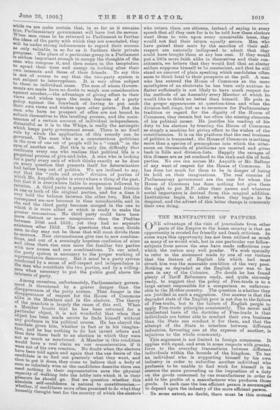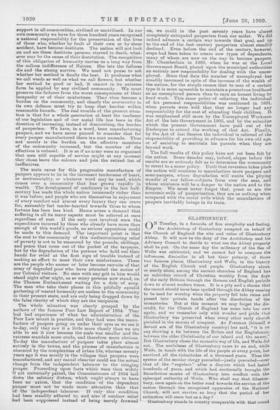THE MANUFACTURE OF PAUPERS.
ONE advantage of the visit of journalists from other parts of the Empire to the home country is that au opportunity is created for friendly and frank criticism. In some ways this opportunity has not been utilised as much as many of us would wish, but in one particular our fellow- subjects from across the seas have made reflections over which the nation may well ponder. We wish specially to refer to the statement made by one of our visitors that the feature of English life which bad most struck him was the miserable condition of the very poor. Nothing so degraded as the English poor was to be seen in any of the Colonies. No doubt he has found plenty of Tariff Reformers ready, and quite sincerely ready, to suggest that the policy of Free-trade is to a large extent responsible for a comparison so unfavour- able to the Mother-country. The question is whether they are justified in such a suggestion. Our answer is that the degraded state of the English poor is not due to the failure of Free-trade, but to the failure of English people to apply Free-trade principles consistently. The moral and intellectual basis of the doctrine of Free-trade is that individuals are bettor able to conduct their own business than the State can conduct it for them, and that the attempt of the State to interfere between different industries, favouring one at the expense of another, is injurious to the whole community.
This argument is not limited to foreign commerce. It applies with equal, and even in some respects with greater, force to the everyday transactions between different individuals within the bounds of the kingdom. To tax an individual who is supporting himself by his own industry in order to subsidise another individual who professes to be unable to find work for himself is in essence the same proceeding as the imposition of a duty on the goods consumed by one manufacturer in order to add to the profits of a manufacturer who produces those goods. In each case the less efficient person is encouraged to depend upon the industry of the more efficient person.
To some extent, no doubt, there must be this mutual support in all communities, civilised or uncivilised. In our own eommunity we have for three hundred years recognised a national responsibility for the preservation of the lives of those who, whether by fault of their own or by sheer accident, have become destitute. The nation will not look on and see these destitute persons starved to death, what- ever may be the cause of their destitution. The recognition of this obligation of humanity carries us a long way from the callous indifference of Nature. She lets the failures die and the strong survive. We need not pause to ask whether her method is finally the best. It produces what we call weeds as well as what we call flowers, but whether her method be good or bad, it cannot in its extreme form be applied by any civilised community. We must preserve the failures from the worst consequences of their incapacity or of their misfortune. They thus become a burden on the community, and clearly the community in its own defence must try to keep that burden within reasonable bounds. The real trouble of the present situa- tion is that for a whole generation at least the tendency of our legislation and of our social life has been in the direction of increasing, instead of diminishing, the burden of pauperism. We have, in a word, been manufacturing paupers, and we have never paused to consider that for every pauper manufactured there is a man unmade. Thus not merely is the burden on the effective members of the community increased, but the number of the effectives is reduced. It is as if an army were so organised that men still capable of service might at any moment they chose leave the colours and join the retired list of ineffecti yes.
The main cause for this progressive manufacture of paupers appears to lie in the increased tenderness of heart, or sentimentality, or whatever word may be used, which comes over a community that has grown rapidly in wealth. The development of machinery in the last half- century has made the whole nation immensely richer than it was before, and people who are themselves in enjoyment of every comfort and almost every luxury they can crave for, excusably feel tender-hearted towards those to whom fortune has been less kind. Hence arises a demand that suffering in all its many aspects must be relieved at once , regardless of cost. , If the only cost involved were the expenditure incurred by those who already have more than enough of this world's goods, no serious opposition could • be made to this demand. The important point is that the cost to the community of this undiscriminating relief 'of poverty is not to be measured by the pounds, shillings, and pence that come out of the pocket of the taxpayer, but by the degradation of the persons who hold out their hands for relief at " the first sign of trouble instead of making an effort to meet their own misfortunes. These are the people who sooner or later become recruits of that .army of degraded poor who have attracted the notice of our Colonial visitors. No man with any grit in him would stand night after night, as so many persons now stand, on the Thames • Embankment waiting for a dole of soup. The men who take their places in this pitifully squalid • gathering of wasted humanity are useless to the community in their present state, and are only being dragged down by 'the false charity of which they are the recipients.
The whole 'situation was clearly grasped by the authors of the famous Poor Law Report of 1834. They bad bad experience of what lax administration of the Poor Law meant in practice, and they bad seen the menu- facture' of paupers going on under their eyes as we see it to-day, only they saw it a, little more closely than we are able to see it now because the scale was smaller and the extreme scandals more crude, and therefore more obvious. To-day the manufacture of paupers takes place almost entirely in the towns, and the process of manufacture is obscured by the complexities of urban life, whereas seventy years ago it was mostly in the villages that paupers were manufactured, and any casual observer could see the actual change from the independent labourer to the cringing pauper. ' Proceeding upon facts which were then widely 'if not universally patent, the Commissioners of 1834 laid &tin the salutary dictum, which ought always to have been an'• atiom, that the condition of the dependent pauper must not • be made more attractive than that of the independent labourer. If only this condition had been steadily adhered to, and also if outdoor relief had been suppressed instead of being merely frowned on, we could in the past seventy years have almost completely extirpated pauperism from our midst. We did indeed advance a certain way towards that goal, and up to the end of the last century pauperism almost steadily declined. Even before the end of the century, however, steps had been taken to create new types of dependents, many of whom are now on the way to become paupers. Mr. Chamberlain in 1886, when he was at the Local Government Board, placed upon the municipal authorities an entirely new responsibility for dealing with the unem- ployed. Since that date the number of unemployed has steadily increased in spite of the increase of the wealth of the nation, for the simple reason that to men of a certain type it is more agreeable to maintain a precarious livelihood as an unemployed person than to earn an honest living by hard work. This same policy of relieving the individual of his personal responsibilities was continued in 1891, when parents were told that they no longer had any responsibility for the cost of educating their children. It was emphasised still more by the Unemployed Workmen Act of the late Government in 1905, and by the subsidies which the present Government have paid out of the Exchequer to extend the working of that Act. Finally, by the Act of last Session the individual is relieved of the responsibility of providing in advance for his own old age, or of assisting to maintain his parents when they are beyond work.
The full results of this policy have not vet been felt by the nation. Some decades may, indeed, elapse before the results are so seriously felt as to determine the community to revert to a saner policy. Until that reversion takes place the nation will continue to manufacture more paupers and semi-paupers, whose degradation will excite the pitying wonder of our fellow-subjects from over the seas, and whose existence will be a danger to the nation and to the Empire. We must never forget that, great as are the economic evils of pauperisation, they are as nothing when compared with the moral evils which the manufacture of paupers inevitably brings in its train.



























































 Previous page
Previous page